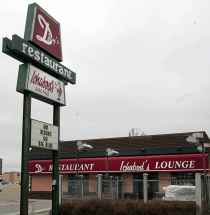Mask-wearing on the menu, but little else changing at city bars, eateries
Read this article for free:
or
Already have an account? Log in here »
To continue reading, please subscribe:
Monthly Digital Subscription
$0 for the first 4 weeks*
- Enjoy unlimited reading on winnipegfreepress.com
- Read the E-Edition, our digital replica newspaper
- Access News Break, our award-winning app
- Play interactive puzzles
*No charge for 4 weeks then price increases to the regular rate of $19.00 plus GST every four weeks. Offer available to new and qualified returning subscribers only. Cancel any time.
Monthly Digital Subscription
$4.75/week*
- Enjoy unlimited reading on winnipegfreepress.com
- Read the E-Edition, our digital replica newspaper
- Access News Break, our award-winning app
- Play interactive puzzles
*Billed as $19 plus GST every four weeks. Cancel any time.
To continue reading, please subscribe:
Add Free Press access to your Brandon Sun subscription for only an additional
$1 for the first 4 weeks*
*Your next subscription payment will increase by $1.00 and you will be charged $16.99 plus GST for four weeks. After four weeks, your payment will increase to $23.99 plus GST every four weeks.
Read unlimited articles for free today:
or
Already have an account? Log in here »
Hey there, time traveller!
This article was published 25/09/2020 (1905 days ago), so information in it may no longer be current.
Many of the recent COVID-19 infections in Winnipeg have been linked to bar-hopping and restaurant-going 20-somethings, yet Manitoba’s new pandemic restrictions taking effect Monday don’t specifically target drinking establishments and eateries.
Rather than ordering licensed establishments in Winnipeg and the surrounding communities to stop serving alcohol at an earlier time, as Quebec, Ontario and B.C. have done to slow the spread of the virus, Manitoba’s chief public health officer said consultation with stakeholders is needed first.
“Government and public health officials will be consulting with the restaurant industry as well as bars, beverage rooms, brew pubs, microbreweries and distilleries on steps that could be further implemented to lower the risk of COVID transmission,” Dr. Brent Roussin said Friday at an impromptu news conference. “Additional steps may be put in place following these consultations.”
Roussin noted the mandatory mask rule for public places will apply to bars and restaurants.
“Staff and patrons will be expected to wear a mask except while seated at a table to eat and drink,” he said.
Beyond that, nothing changes — for now.
Bars and restaurants will continue to follow current orders regarding capacity and tables being two metres apart. Additional steps, such as imposing an earlier last-call for alcohol or limiting capacity, will be on the agenda when public health consults with the industry, he said.
“We’re going to immediately start engaging with these sectors because we need to change the way things are operating right now,” Roussin said. “There’s restaurants and bars that have done their part but we do see significant transmission in that sector. So we do need to engage with them and come up with a way to change the way things are happening right now.”
A day earlier, at his regularly scheduled Thursday press briefing, Roussin sounded the alarm about bars and restaurants. He provided examples of how the virus is being spread in Winnipeg in recent weeks — mainly by people in their 20s, including one bar-hopper with COVID-19 symptoms who possibly infected multiple people after having 36 reported contacts.
On Friday, the public health chief announced Winnipeg and its neighbouring communities will have their status under the province’s pandemic response system elevated to restricted (orange), with new restrictions taking effect Monday. However, pandemic rules for bars and restaurants will remain mostly untouched.
Other provinces have experienced similar increases in COVID-19 infection rates linked to bars, restaurants and young people — and they took more targeted measures.
On Friday, the rising rate of COVID-19 cases in Ontario over the past five weeks prompted it to announce that last call at bars and restaurants, including nightclubs, is 11 p.m., effective at 12:01 a.m. Saturday. All strip clubs will be closed until further notice.
“Private social gatherings continue to be a significant source of transmission in many local communities, along with outbreak clusters in restaurants, bars and other food and drink establishments, including strip clubs, with most cases in the 20-39 age group,” the province of Ontario said in a news release.
All businesses and organizations have been ordered to start screening people who wish to enter their premises for COVID-19 symptoms.
In Quebec, health officials announced Sept. 20 that bars and restaurants in affected urban areas including Montreal had to stop serving alcohol at 11 p.m. and close at midnight. Private gatherings were also reduced to a maximum of six people from 10. At events like weddings, barbecues or religious services, a maximum of 25 people are allowed. In settings that involve sitting and little talking, such as movie theatres or concert halls, a 250-person limit remained in place.
Earlier this month in B.C., the province clamped down on nightlife, banquet hall and alcohol-serving establishments, with liquor sales at all venues and private events ending at 10 p.m., and all premises closing by 11 p.m. unless a full meal service is offered.
Restrictions to tamp down the spread of the virus in Winnipeg may have come sooner if the provincial government wasn’t pushing for economic restrictions to be eased, Manitoba Liberal Leader Dougald Lamont alleged Friday.
“On the one hand, we have cases that are up and a declaration of a code orange for Winnipeg but it looks like a whole bunch of things aren’t going to change at all including where infections are taking place,” Lamont told reporters at a press conference.
He referred to a copy of a letter from an assistant deputy minister of health dated Sept. 23 that said, “Manitoba is now in a position to ease some of the restrictions and support economic recovery by taking measures to restore some services.” The letter sent this week — while Winnipeg infection rates continued to rise —said consultation with key sectors will be held, and restrictions will be eased based on public health and safety.
“That really makes it sound like everything’s OK,” Lamont said. “It seems very clear to me there’s a gap between the politics of the pandemic and the public health aspect.”
The provincial government did not respond to a request for comment Friday afternoon.
carol.sanders@freepress.mb.ca

Our newsroom depends on a growing audience of readers to power our journalism. If you are not a paid reader, please consider becoming a subscriber.
Our newsroom depends on its audience of readers to power our journalism. Thank you for your support.







